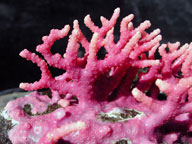NewsUSA) – Corals are not usually the first things to come to people’s minds when asked what kinds of animals inhabit the world’s oceans. Most people only come in contact with coral as jewelry or decoration or when snorkeling or diving. For many of us, corals are often viewed as some sort of rock or plant. However, corals are among the most vital animals in the sea, providing shelter and food for some 25 percent of the world’s marine species.
Left to thrive, corals provide a wide range of important services worldwide. Sometimes referred to as the “rainforests of the oceans,” corals and coral reefs allow for a variety of both large and small fish to survive and thrive, providing food for coastal communities worldwide. They form a natural barrier that provides protection for communities during potentially-damaging storms. Their natural beauty also brings in tourist dollars. Combined, these resources and services are estimated to be worth $375 billion annually.
Yet, corals around the world are in decline. Recent scientific studies estimate that 20 percent of the world’s coral reefs have been lost, and another 24 percent could be lost in our lifetime. Climate change, pollution, destructive fishing methods, overfishing, and consumer demand for their use in jewelry and home décor items are threatening their survival.
People living far from the ocean may think there’s not much they can do to help preserve corals, but, to the contrary, they can help just by taking the following steps:
- Avoid purchasing real coral. Buy jewelry or home décor products that use other materials. Companies like Tiffany & Co. and Pottery Barn are two companies that no longer use real coral in their creations. For more ocean-friendly gift ideas, visit www.tooprecioustowear.org.
- Reduce fuel and energy consumption. Corals will have a better chance of surviving global climate change if seawater temperature increases are curtailed.
- Help stop the pollution of our oceans. Chemical treatments to lawns, oil and other fluids from cars, prescription drugs, paint products, and other hazardous waste that enter our sewers eventually end up in the oceans, creating a toxic environment for all sea life, including corals.
- Make a pledge and take other actions to help preserve corals by going to www.seaweb.org/TPTW/pledge.
Too Precious To Wear is a SeaWeb (www.seaweb.org) coral-conservation campaign with The Tiffany & Co. Foundation and others that work with influencers in the fashion and design industries to discourage the use of real coral in jewelry and decorations.

No comments:
Post a Comment